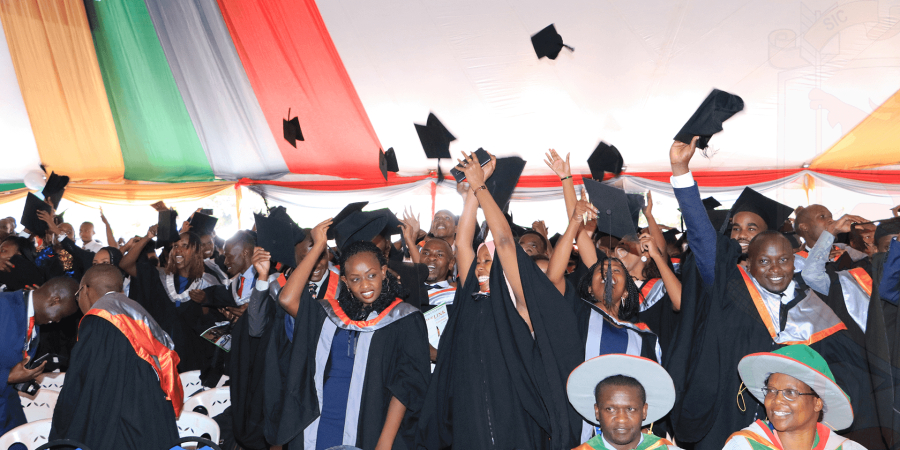Commission for University Education (CUE) has asked institutions of higher learning to tailor their academic programmes towards skill demand to ensure graduates come out of the institutions with the right skills not only for the job market but also for job creation.
The Commission’s CEO, Prof. Mike Kuria, advised the Institutions to refine their training programmes and ensure students were well-equipped with skills and knowledge to handle and provide solutions to various challenges facing the country.
Kuria said there was a need for the Universities to introduce new undergraduate, graduate, and postgraduate degree programmes designed to meet evolving market needs and proposed the introduction of programmes spread across business management, science and technology, leadership, and governance fields to be delivered using contemporary academic models, including online options.
The introduction of the new programmes, Prof. Kuria said, should also be geared towards supplying the international job market with a pool of well-trained candidates well versed in relevant research and information technology applications.
“The world is now a global village, and our institutions of higher learning should actively revise and improve their academic delivery missions to guarantee our graduates a place at the global job market table,” he said.
Speaking during the fifth National Forum for Universities, TVETs, and Agricultural Stakeholders at Egerton University Njoro Main Campus, the CEO stated that the Commission for University Education was committed to facilitating a higher education paradigm shift in the country by overseeing the delivery of market-driven programmes in contemporary fields.
In reference to curriculum, Prof. Kuria said there was a need for continuous thinking about incorporating interdisciplinary approaches to relevant curricula to inculcate experiential learning, where programmes could be reviewed often due to regular changes in technology and the ever-changing labour market.
The CEO’s keynote address focused on “Repositioning Higher Education Institutions to meet the changing market needs in a resource-constrained environment,” where he underscored the importance of linking industry with academia to instill the soft skills required for performing tasks effectively.
“We must think about how technology will change the kind of graduates we produce. With the influx of artificial intelligence like chatGPT, university lectures are grappling with the students’ getting answers and references to the assignments they are given through commanding the AI platforms,” he explained.
The CEO challenged institutions of higher learning to explore ways of integrating technological advancement in learning processes, adding that there was a need for more flexibility and adaptability in the way teaching and testing of students are done through changing learning models and personalised education.
He said the Commission had been asked to come up with regulations on how to adapt technology into curricula and suggested that they should avoid erecting barriers while adopting technology, whereby Kenya’s education system would be good enough to attract students beyond the country.
The CEO said the Education Ministry should also ensure all courses offered in universities and colleges are certified by Commission for University Education, adding that there are some courses that have been rendered irrelevant by the ministry due to a lack of accreditation, an issue that affects learners who spend several years studying and using a lot of money.
“We need a proper mechanism that will monitor what universities train learners to be in line with what is required by the ministry. This will help avert cases of some students failing to register for some courses,” he said.
Prof. Kuria further said there was a need to put a stop to a disturbing disconnect, where employers complain that the country is still suffering from a general shortage of useful and relevant skills at the graduate, technologist, and technician levels.
Egerton University Vice-Chancellor Prof. Isaac Kibwage stated that research holds the key to unlocking the country’s industrial potential while urging training institutions to embrace innovation as this would boost skill development.
Prof. Kibwage challenged Technical and Vocational Education and Training (TVET) institutes to commercialise innovations and research by their students and tutors to enable them to tap their full potential in income-generating activities.
He urged students and instructors at polytechnics, TVETs, and universities to forge powerful collaborations with the business sector to translate research findings into industries to create wealth and jobs. To achieve this, he said institutions of higher learning should deliberately march towards becoming the springboards of economic development in the country.
The VC observed that the institutions carry a grave responsibility as catalysts for socio-economic development through the creation of new knowledge, research and innovation, incubation and entrepreneurship, and the eventual commercialization of outputs emanating from these initiatives.
He indicated that it is vital and urgent that Kenyan institutions endeavour to inculcate an entrepreneurial mindset among students to not only make them ready for the job market but, more importantly, catalyse a paradigm shift from seeking formal employment to being job creators and employers by utilising their creative and innovative abilities.
By Esther Mwangi and Sam Karanja





